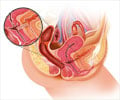A new study reveals that estrogen-deficient, postmenopausal women who have had hysterectomy appear to have stiffer arteries compared to similar women who have not had the surgery.

"The message here is that having a hysterectomy may lead to large artery stiffening, which can lead to the development of cardiovascular disease," said Kerrie Moreau, Ph.D., lead author of the study and associate professor of medicine at the University of Colorado School of Medicine. "Knowing this, women who have had a hysterectomy will need to be more vigilant about their cardiovascular health."
The study was published today in Menopause: The Journal of the North American Menopause Society.
Hysterectomies are the second most common surgical procedure among women, with about 600,000 performed each year.
Moreau and her colleagues studied 103 postmenopausal women who were not taking any hormone replacement therapy. None had a history of cardiovascular disease or typical risk factors for cardiovascular disease such as high blood pressure, diabetes or high cholesterol.
One group of postmenopausal women had their uterus removed, whereas a second group had their ovaries removed along with their uterus. A third group had both their ovaries and uterus. Moreau compared the rates of arterial stiffening of the carotid artery, located in the neck, of the two groups of women who had hysterectomies to the women who did not.
Advertisement
"Think of an artery like a balloon that needs to expand when the heart pumps out blood," Moreau said. "If the artery becomes stiff it's like pumping into a hose that doesn't expand. The heart feels the pressure and has to work harder to pump blood to the body. Over time, arterial stiffening can lead to high blood pressure, enlargement of the heart and possibly heart failure."
Advertisement
Moreau said it could be related to hormonal changes and decreased estrogen levels after the ovaries and uterus are removed.
"There is considerable evidence to suggest that estrogen plays a key role in protecting women against the effects of cardiovascular disease. Removal of the ovaries, which generate estrogen, leads to early menopause," she said. "Prior research has shown that even if ovaries remain, removal of the uterus can cause blood flow to be disrupted to the ovaries which can lead to early menopause as well."
Moreau said she hopes to do a follow-up study of women before and after they have hysterectomies to better understand the mechanisms involved, as well as appropriate interventions or lifestyle changes needed to preserve cardiovascular health.
"But just knowing that having a hysterectomy may lead to a decline in cardiovascular health can help women take steps to ensure better cardiovascular health like getting enough exercise and/or eating well after undergoing a hysterectomy, " she said.
Last February, Moreau discovered that a specific chemical cofactor could dramatically improve vascular function in postmenopausal women. That study also highlighted the benefits of estrogen to vascular health in females.
"Because women are living longer and will be spending at least a third of their life-span after menopause it is important to understand how declines in estrogen levels may lead to adverse changes in cardiovascular health," she said. "We need to prevent this since cardiovascular disease is the number one killer of women."
Source-Eurekalert















